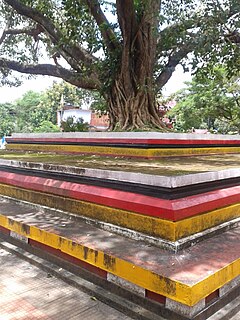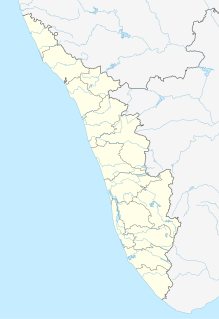Related Research Articles

Bekal Fort was built by Shivappa Nayaka of Keladi in 1650 AD, at Bekal. It is the largest fort in Kerala, spreading over 40 acres (160,000 m2).

Vahana denotes the being, typically an animal or mythical entity, a particular Hindu deity is said to use as a vehicle. In this capacity, the vahana is often called the deity's "mount". Upon the partnership between the deity and his vahana is woven much iconography and mythology. Deities are often depicted riding the vahana. Other times, the vahana is depicted at the deity's side or symbolically represented as a divine attribute. The vahana may be considered an accoutrement of the deity: though the vahana may act independently, they are still functionally emblematic or even syntagmatic of their "rider". The deity may be seen sitting or standing on the vahana. They may be sitting on a small platform called a howdah, or riding on a saddle or bareback. Vah in Sanskrit means to carry or to transport.
Kolathiri or Kolathiri Rājā was the title by which the senior most male along the matrilinieal line of the Mushika or Kolathunādu Royal Family (Kolaswarũpam) was styled. The Mushika Family came to be known as Kolathiri over the centuries, and were directly related to, and descended from the Cheras, Pandyas, Cholas and the Ay originating in the Thiruvananthapuram area. The Kolathiri would have started out as a branch of the Cheras and the Ay in the period it was known as Mushika. They had their seat at Ezhimala in Kerala, India and was one of the major political houses which became completely independent and prominent in Kerala, after the disappearance of the imperial Kulasekharas or Perumāl rulers of Mahodayapuram by the twelfth century AD. The Kolathiri family and the Travancore family reciprocally adopted girl-children from each other for several centuries right into the 1990s.

Kolattunādu was one of the 4 most powerful kingdoms on the Malabar Coast during the arrival of Portuguese Armadas to India, the others being Zamorin, Kingdom of Cochin and Quilon. Kolattunādu had its capital at Ezhimala and was ruled by Kolattiri Royal Family and roughly comprised the whole northern districts of Kerala state in India. Traditionally, Kolattunādu is described as the land lying between Perumba river in the north and Putupattanam river in the south.

Ezhimala, a hill reaching a height of 286 metres, is located near Payyanur, in Kannur district of Kerala, south India. It is a part of a conspicuous and isolated cluster of hills, forming a promontory, 38 km north of Kannur (Cannanore).

Varadvinayak, also spelt as Varadavinayaka, is one of the Ashtavinayak temples of the Hindu deity Ganesha. It is located in Mhad village situated in Khalapur taluka near Karjat and Khopoli of Raigad District, Maharashtra, India. The temple was built (restored) by Peshwa General Ramji Mahadev Biwalkar in 1725AD.
Dravida is mentioned as one of the kingdoms in the southern part of present-day mainland India during the time of the Mahabharata. Sometimes the name Dravida was used to denote all the southern kingdoms collectively and sometimes as a separate kingdom.
Karnata was a southern kingdom ruled by -rulers during the period of the epic Mahabharata. The southern Karnata kingdom gave the name to the Indian state Karnataka. The Karnata Kingdom forms the northern and central portion of Karnataka state of India.

Mahisha or Mahishaka was a kingdom in ancient India, ruled by the Asura king Mahisha. His capital, Mahisha City, is currently known as Mysore a city in Karnataka. This kingdom is mentioned in Mahabharata, though Puranas gives more information. The name Mahisha means great, powerful.

Mushika dynasty, also spelled Mushaka, Tamil/Malayalam: Eli or Ezhi, was a minor dynastic power that held sway over the region in and around Mount Ezhi (Ezhimala) in present-day Kerala, south India. The country of the Mushikas, ruled by an ancient lineage of velir-level chieftains of the same name, appears in early historic (pre-Pallava) south India. Early Tami poems contain several references to the exploits of Nannan of Ezhimalai. Nannan was known as a great enemy of the pre-Pallava Chera chieftains. The clan also had matrimonial alliances with the Chera, Pandya and Chola chieftains.

Pazhayangadi, is a small township, approximately 22 kilometers north of district headquarters Kannur, 14 kilometers south of Payyanur and 14 kilometers west of Taliparamba in the South Indian state of Kerala. In the local language of Malayalam it literally means "Old Market". The town is bounded by the Madayi Hills (Madayippara) on the west and by the Pazhayangadi River on the south. Ezhimala, a range of hills, that is believed to be home to a variety of medical herbs including mrithasanjeevini, and a very ancient recorded history, is situated nearly 8 km west of Pazhayangadi. Pazhayangadi town is spread over Madayi and Ezhome Panchayaths. Madayi Hill offers a splendid scene of Ezhimala which means a chain of seven mountains, where the Indian Naval Academy is situated.
Sreekandapuram is a municipality in Kannur district, in the Indian state of Kerala..

Pulingome is a village in Kannur District of Kerala state, south India.

The Corticiales are an order of fungi in the class Agaricomycetes. The order is mostly composed of corticioid fungi, but also includes one anomalous agaricoid species, Marchandiomphalina foliacea. Species within the order are generally saprotrophic, most of them wood-rotters, but several are parasitic on grasses or lichens. Those of economic importance include Waitea circinata, a pathogen of cereal crops, and Laetisaria fuciformis, the cause of red thread disease in turf grass.
Manantheri is a village near Kuthuparamba in Kannur district in the Indian state of Kerala.

Eluka Majaka is a Telugu comedy film directed by Relangi Narasimha Rao. The film stars Vennela Kishore, Brahmanandam, Raghu Babu and Pavani. The film is the jointly produced by Marella Narasimha Rao and Vaddempudi Srinivasa Rao under the production company Naa Friends Art Movies. This is the 75th film of Relangi Narasimha Rao.

Devullu is a 2000 Telugu Supernatural film, produced by Chegondi Haribabu and Karatam Rambabu under the Babu Pictures banner and directed by Kodi Ramakrishna. It stars Babloo Prithiveeraj, Raasi, Master Nandan, Baby Nitya in the lead roles, while Suman, Srikanth, Rajendra Prasad, Ramya Krishna, Laya were in crucial roles and music was composed by Vandemataram Srinivas. The film recorded as a Blockbuster at the box office.

Vadeshwaram Temple is a Shiva temple located at Aroli in the Kannur district of Kerala, India.
Mushika-vamsha is a Sanskrit dynastic chronicle composed in 11th century by poet Atula. It narrates the legendary history of the Mushika dynasty, which ruled the northern part of the present-day Kerala state of India. The chronicle moves from mythological beginnings of the founding ancestors to more authentic genealogical history in later sargas.

Ramanthali inscriptions, also known as Ezhimala-Narayankannur inscriptions, are two medieval stone epigraphs from Ramanthali, near Ezhimala in Kannur district, Kerala. The first inscription, mentioning Mushika Validhara Vikrama Rama and the merchant guild manigramam, is dated to 929 CE and the second inscription, mentioning Alupa king Kunda Alupa, is dated to 1075 CE. Both inscriptions are written in old Malayalam with Vattezhuthu script.
References
- ↑ Binu John Mailaparambil (11 November 2011). Lords of the Sea: The Ali Rajas of Cannanore and the Political Economy of Malabar (1663-1723). BRILL. pp. 10–. ISBN 978-90-474-4471-8.
| This article about a poet from India is a stub. You can help Wikipedia by expanding it. |